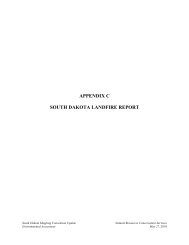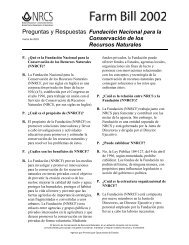The Ozette Prairies of Olympic National Park - Natural Resources ...
The Ozette Prairies of Olympic National Park - Natural Resources ...
The Ozette Prairies of Olympic National Park - Natural Resources ...
Create successful ePaper yourself
Turn your PDF publications into a flip-book with our unique Google optimized e-Paper software.
inches high and the berries and crowberries were also very small, as were the strawberries along the way;<br />
and the ferns <strong>of</strong> the prairie were only two fingers high. I saw many people gathering berries and fern<br />
roots, the latter to be made into bread. <strong>The</strong>se people were not a finger-length high.”<br />
At another time another medicine man, who was doctoring a patient that recovered, gave an account <strong>of</strong><br />
his journey to those present, on coming out <strong>of</strong> the trance, as follows: “I passed over the river <strong>of</strong> the dead<br />
to its other side. <strong>The</strong> people I saw there were large, strong and happy, and the trees were all large. <strong>The</strong><br />
berries were larger than I ever saw here, and all the bushes were heavily loaded with fruit. <strong>The</strong>re were<br />
also plenty <strong>of</strong> game in the prairies and fern roots for bread; and there were feasts and dances every day in<br />
that happy land.”<br />
Pettitt, George A. [1950] <strong>The</strong> Quileute <strong>of</strong> La Push, 1775-1945. Anthropological Records, Vol. 14:1,<br />
George Pettitt spent World War II in LaPush in the Coast Guard. After the war, he attended the<br />
University <strong>of</strong> California at Los Angeles and went back to the Quileute to gather information for this community<br />
history. As far as the Quileute recall, he never returned to LaPush after finishing his fieldwork<br />
among them. His dissertation was, essentially, a community history and sociological study <strong>of</strong> Quileute<br />
acculturation. Unexplainably, he neither mentions the importance <strong>of</strong> prairie resources in tribal pre-contact<br />
economics, nor does he mention the reasons for their decline in maintenance and usage.<br />
[p. 1] Quileute Territory <strong>The</strong>ir territory, starting some thirty miles south <strong>of</strong> cape Flattery, extends approximately<br />
thirty miles south along the Pacific coast and thirty miles inland. Except for a few meadows<br />
and prairies <strong>of</strong> limited size along the rivers, the country is rough and mountainous and covered by a<br />
dense tangle <strong>of</strong> trees and brush… <strong>The</strong> brush, particularly along the edges <strong>of</strong> prairies, stream, and roads,<br />
contains a high percentage <strong>of</strong> wild berries, black, elder, salal, salmon, thimble, etc.<br />
[p. 28] Conflicts with Whites. <strong>The</strong>re was some friction as land was homesteaded and the Indians found<br />
it expedient to move out <strong>of</strong> the back country and congregate at the mouths <strong>of</strong> the rivers, but it never came<br />
to a dangerous break because very little <strong>of</strong> the homesteaded land could be cleared and cultivated—it<br />
was held for the timber on it and could still be used for hunting, and hunting land animals was a minor<br />
part <strong>of</strong> Quileute food economy in any case. [earlier] Morton Penn recalls that when his family moved<br />
from its upper river home to LaPush, the farmer on whose land they found themselves was loath to have<br />
them move and several times invited them to move back. Because the prairie areas were not completely<br />
settled, there were still areas available for foraging, and quickly the Quileute appetite for traditional roots<br />
was replaced with potatoes and other root vegetables traded or received in payment for work on farms,<br />
or increasingly grown in the Quileutes’ own garden plots.<br />
144
















